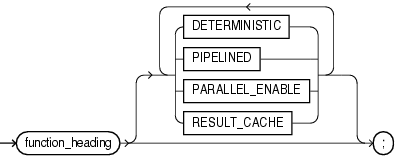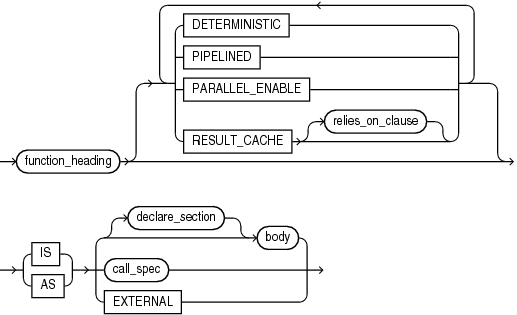Function Declaration and Definition
A function is a subprogram that returns a value. The data type of the value is the data type of the function. A function invocation (or call) is an expression, whose data type is that of the function.
Before invoking a function, you must declare and define it. You can either declare it first (with function_declaration) and then define it later in the same block, subprogram, or package (with function_definition) or declare and define it at the same time (with function_definition).
A function declaration is also called a function specification or function spec.
Note:
This topic applies to nested functions. For information about standalone functions, see "CREATE FUNCTION Statement". For information about package functions, see "CREATE PACKAGE Statement".
Description of the illustration function_declaration.gif

Description of the illustration function_heading.gif
See:

Description of the illustration function_definition.gif
See:

Description of the illustration relies_on_clause.gif
Declares a function, but does not define it. The definition must appear later in the same block, subprogram, or package as the declaration.
Tells the optimizer that the function returns the same value whenever it is invoked with the same parameter values (if this is not true, then specifying DETERMINISTIC causes unpredictable results). If the function was invoked previously with the same parameter values, the optimizer can use the previous result instead of invoking the function again. DETERMINISTIC can appear only once in the function.
Do not specify DETERMINISTIC for a function whose result depends on the state of session variables or schema objects, because results might vary across invocations. Instead, consider making the function result-cached (see "Making Result-Cached Functions Handle Session-Specific Settings" and "Making Result-Cached Functions Handle Session-Specific Application Contexts").
Only DETERMINISTIC functions can be invoked from a function-based index or a materialized view that has query-rewrite enabled. For more information and possible limitations of the DETERMINISTIC option, see "CREATE FUNCTION Statement".
It is good programming practice to make functions that fall into these categories DETERMINISTIC:
-
Functions used in a
WHERE,ORDERBY, orGROUPBYclause -
Functions that
MAPorORDERmethods of a SQL type -
Functions that help determine whether or where a row appears in a result set
Restriction on DETERMINISTIC You cannot specify DETERMINISTIC for a nested function.
See Also:
-
CREATEINDEXstatement in Oracle Database SQL Language Reference
Use only with a table function, to specify that it is pipelined. A pipelined table function returns a row to its invoker immediately after processing that row and continues to process rows. To return a row (but not control) to the invoker, the function uses the "PIPE ROW Statement". PIPELINED can appear only once in the function.
Restriction on PIPELINED You cannot specify PIPELINED for a nested function.
Note:
You cannot run a pipelined table function over a database link. The reason is that the return type of a pipelined table function is a SQL user-defined type, which can be used only in a single database (as explained in Oracle Database Object-Relational Developer's Guide). Although the return type of a pipelined table function might appear to be a PL/SQL type, the database actually converts that PL/SQL type to a corresponding SQL user-defined type.Enables the function for parallel execution, making it safe for use in slave sessions of parallel DML evaluations. PARALLEL_ENABLE can appear only once in the function.
Restriction on PARALLEL_ENABLE You cannot specify PARALLEL_ENABLE for a nested function.
Caches the results of the function. RESULT_CACHE can appear only once in the function. For more information, see "PL/SQL Function Result Cache".
Restriction on RESULT_CACHE You cannot specify RESULT_CACHE for a nested function.
Name of the function that you are declaring or defining.
Specifies the data type of the value that the function returns, which can be any PL/SQL data type (see Chapter 3, "PL/SQL Data Types").
Restriction on datatype You cannot constrain this data type (with NOT NULL, for example). If datatype is a constrained subtype, then the returned value does not inherit the constraints of the subtype (see "Formal Parameters of Constrained Subtypes").
Either defines a function that was declared earlier or both declares and defines a function.
Declares items that are local to the function, can be referenced in body, and cease to exist when the function completes execution.
Required executable part and optional exception-handling part of the function. In the executable part, at least one execution path must lead to a RETURN statement; otherwise, a runtime error occurs.
See "call_spec" and "EXTERNAL".
Restriction on call_spec, EXTERNAL These clauses can appear only in a package specification or package body.
Specifies the data sources on which the results of the function depend. Each data_source is the name of either a database table or view.
Note:
-
This clause is deprecated. As of Oracle Database 12c, the database detects all data sources that are queried while a result-cached function is running, and
relies_on_clausedoes nothing. -
You cannot use
relies_on_clausein a function declared in an anonymous block.